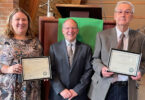…or, how to care for your pastor during these different days
This article is the result of conversations during a recent “Office Hours” online gathering sponsored by the Southern Province Board of Cooperative Ministries. The Rev. David Guthrie, the Rt. Rev. Carol Foltz, and the Rev. Dr. Nola Knouse were the “panelists,” joined by several other participants added very helpful comments.
These days—these months—are unlike anything in our previous experience. As none of us has experienced a pandemic before, our pastors have never had to do ministry under such unusual circumstances. They’ve spent years learning how to communicate from the pulpit; now that pulpit has been, and remains for many, via livestream, YouTube, or video conferencing. They’ve received energy from the congregation during worship services; now they cannot see the faces and body language of the worshipers. They’ve developed a depth of experience in face-to-face interaction, at the bedside, in the hospital, at the church door; those interactions are now severely limited or absent. They’re used to working 50 to 60 hours a week, in ministry that is demanding in the best of circumstances. The fatigue factor is very real, in learning new things and adapting to unfamiliar technology. “Zoom gloom” and “Zoom fatigue” are very real.
Now the pastor may have to spend an additional 10 to 20 hours a week to record a service, edit the recording and post it to YouTube. The pastor may miss the good things that are happening in members’ lives, things they would normally hear in casual conversation. Some pastors are under pressure from a vocal minority in the congregation to open up immediately. Some congregants have brought politics into the situation, adding to the stresses. The pastor feels a very real responsibility to protect the most vulnerable of the congregation.
Other church members are reluctant to open up and may feel estranged from the congregation as it does move toward in-person gatherings. The pastor’s strong desire to connect with people in our highly relational Moravian world, adds stress. And we must remember that the pastor has a family, too. The pastor may be trying to work from home, at the same time that his/her spouse is trying to work from home, at the same time his/her child is going to school from home, at the same time that his/her parent needs transportation to the doctor’s office. All of these day-to-day activities are very different.
In addition to all these stressors, the restrictions brought about in response to COVID mean that many pastors can no longer easily do the things they used to do to relieve stress. So, just like for the members, the stresses of COVID mount up for the pastor.
As congregation members, what can we do to support our pastors? Many of these suggestions can be seen as “light care”—not requiring a great deal of effort—but the impact can be very significant.
- Pray for the pastor. And tell him/her you’re doing it.
- If you’re in a meeting, plan ahead to have someone in the room pray aloud for the pastor.
- Write a personal note of appreciation for the things they are doing.
- Call the pastor, tell him/her you are bringing a meal, and they just need to confirm what date (and any dietary restrictions). Then do it.
- Encourage congregants to talk with the pastor about concerns, not about the pastor.
- Tell the pastor the good things that are happening—don’t just reach out with the problems!
- Share in the care. Don’t expect the pastor to handle all the congregational care!
- Don’t put pressure on the pastor to open things up too quickly. They are trying to balance the need to open up with the health and wellbeing of everyone and the desire not to have to preside at a funeral.
- Make sure your pastor takes her/his day off and all allotted vacation. Give them some extra time off to allow them to deal with these additional stressors.
- Encourage the pastor to take advantage of the care resources available to them through the province in which they serve. These include speaking with a bishop, taking advantage of continuing education grants, and receiving pastoral counseling, spiritual direction or coaching.
- Be kind. In every way you can imagine, be kind.
It’s not solely the congregation’s job to take care of the pastor. The pastor needs to be honest with the congregation about her/his limits, and the “ups and downs” of their ministry. However, there are things each of us can do to help.
And finally—the most important thing we can do: Pray for your pastor. And tell her/him you’re doing it.







